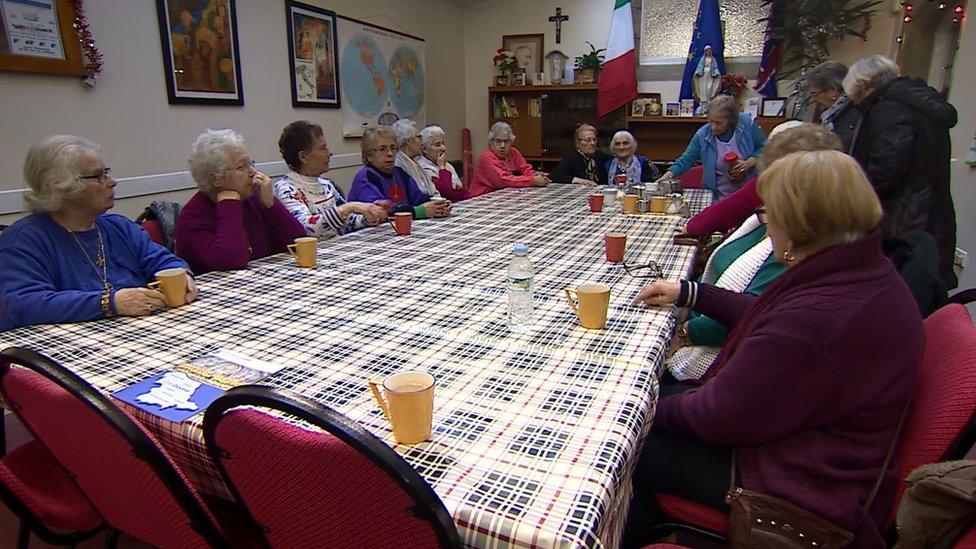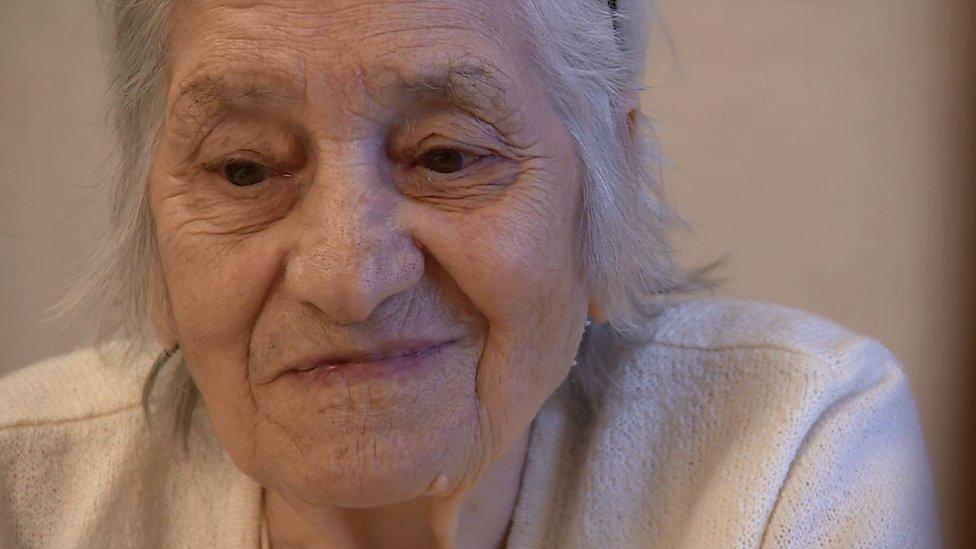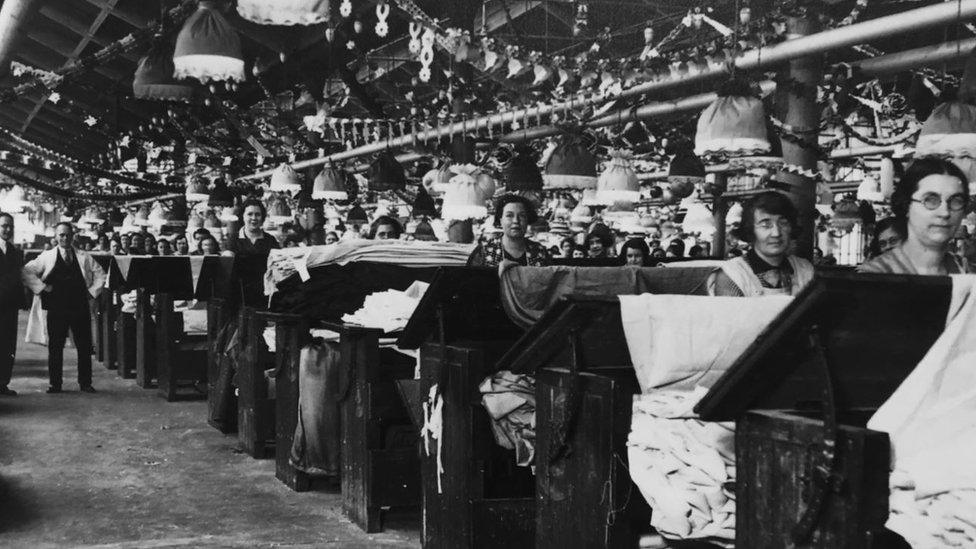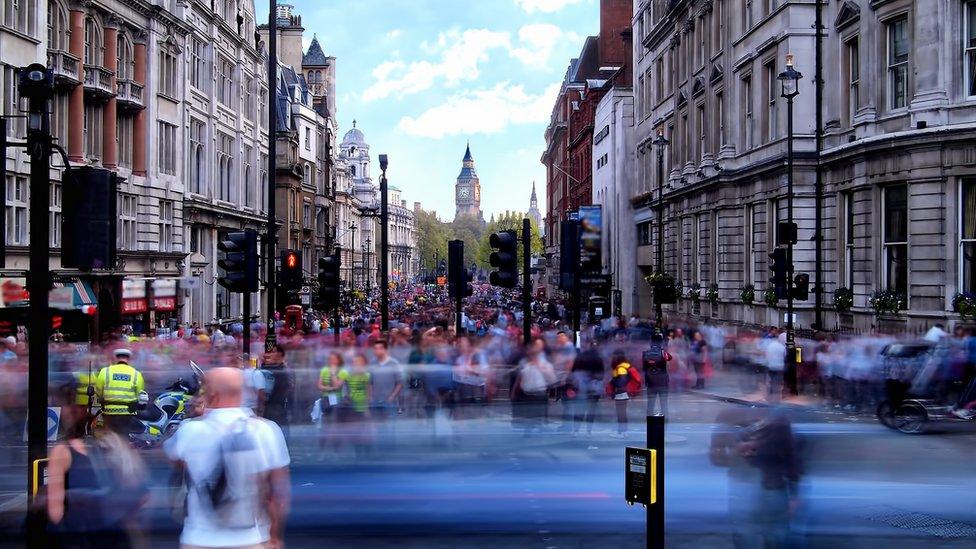The Italians asked to apply to stay in post-Brexit UK
- Published
'I'm English, that's my quandary'
Italian women invited to work in UK mills in the 1950s but now faced with applying to stay after Brexit have said they feel English and have a life here.
Many of the "mill girls" settled in Bradford but do not have UK passports or understand why they need to act.
Despite being given paperwork stating they could remain in the UK, they now have to make new applications to stay.
The Home Office said it would help EU citizens to get the immigration status they needed.
Many in the Italian community in the West Yorkshire city have said they were unsure why they were being asked to prove their residency.
'Why should I apply?'
Maria Olyjnik, who came to the UK in 1959 to work at Salts Mill, said: "I feel English, that's my quandary.
"We are foreigners in Italy, we are foreigners over here."
One woman, who meets with others at the Italian Church Mission in Bradford, said: "Why should I apply? I'm here. I've got residency. I don't understand what there is to apply. Apply for what?"

Many of the Italian community in Bradford are unsure of what they need to do to stay in the UK
Another said: "I've been here long enough. I've got a life here, I've got my children and my grandchildren."
Maria Philburn, who has been writing a blog about her mother Margherita Althajm since the UK voted to leave the European Union, said: "On the day of the referendum result, the blood drained out of my body, and my first thought was what are we going to do with my mum?"
Mrs Althajm, 91, has Alzheimers, and is not aware of what she needs to do.
Her daughter said: "One of the main problems is that a lot of them [the Italian community in Bradford] do not think that they need to apply for anything."
Mrs Althajm was given a certificate of registration - like a work permit - which she kept updated until 1961, when she was told she was exempt from the process and could live in the UK freely.
Mrs Philburn applied through the Windrush scheme so her mother could stay in the UK indefinitely.

91-year-old Margherita Althajm's daughter applied through the Windrush scheme for her mother to be allowed to stay in the UK
"She had to go for her fingerprints, a face recognition thing, and she now has a biometric card to show that she is allowed to stay in this country," she said.
"I'm angry that at 91 she was asked to have her fingerprints taken."
After World War Two, many towns and cities in Italy were ruined by bombing and jobs were scarce.
More people were needed to work in the textile mills in Yorkshire, and a large number were recruited from Italy. Some even had their travel paid for by their employers.
Vie Clerc Lusandu, from the3million, an organisation set up to protect the vulnerable EU citizens at risk from Brexit, said: "If they do not apply they will be considered illegal in the country, regardless of how long those people have been in the country.
"People don't seem to know what they need to do and why they should apply."
Immigration solicitor Luke Piper said: "If you don't do anything, the risks are very serious. You risk not being able to rent property, to access a bank account, you risk being charged for NHS treatment, and you risk being prosecuted for a criminal offence."

An unknown number of women came over to work in the mills from Italy

Advice for EU citizens living in the UK
EU citizens will have to answer three "simple" questions online if they want to continue living in the UK after Brexit, according to the Home Office.
People will be asked to prove their ID, whether they have criminal convictions and whether they live in the UK.
The scheme, external will operate online and via a smartphone app, and Home Secretary Sajid Javid said the government's "default" position would be to grant, not refuse, settled status.

A Home Office spokesperson said: "We want EU citizens living in UK to stay and the settlement scheme will make it easy for them to obtain the immigration status they need.
"We are clear that no-one will be left behind and we are providing up to £9m funding and working closely with organisations that are supporting vulnerable or at-risk people, and their family members, through the application process."
You can find out more about this story on Inside Out Yorkshire and Lincolnshire, which will be broadcast on BBC One at 19:30 GMT on Monday 14 January and on iPlayer afterwards.
- Published21 June 2018

- Published18 April 2018

